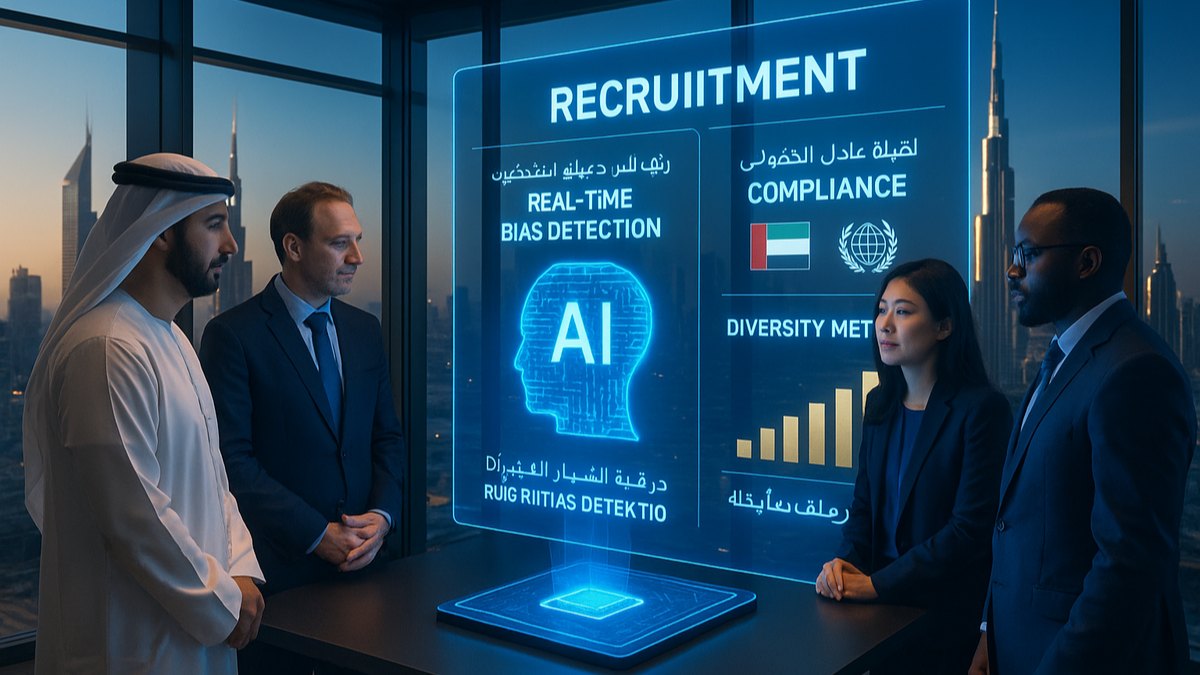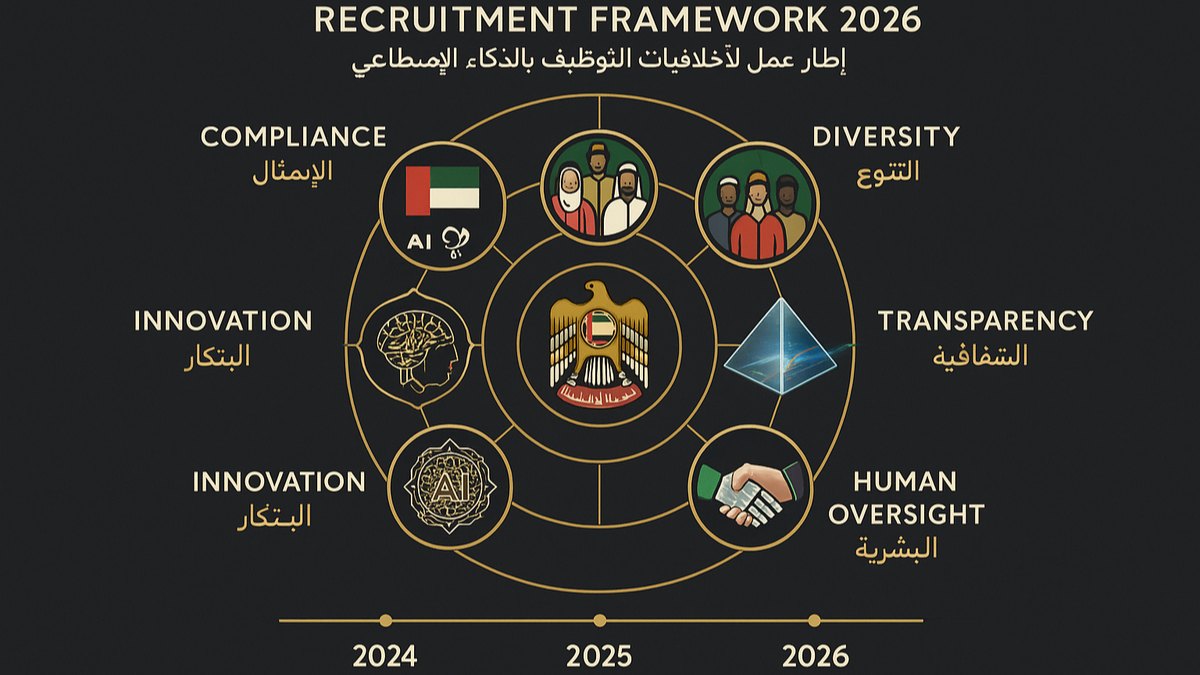Ethical AI in Recruitment 2026: The UAE’s ambitious vision to become a global AI hub by 2031 is transforming every sector, with recruitment at the forefront of this revolution. As we approach 2026, ethical AI in recruitment has evolved from a futuristic concept to an immediate compliance imperative for organisations across the Emirates. At Mahad HRC, we’re pioneering the integration of ethical AI practices that align with the UAE’s values while meeting international standards.
Ethical AI in Recruitment 2026: The UAE’s Unique Position in AI-Driven Recruitment
The Emirates stands as a global recruitment hub, with Dubai and Abu Dhabi attracting talent from over 200 nationalities. This diversity makes Ethical AI in Recruitment 2026 particularly crucial. The UAE’s workforce comprises 89% expatriates, creating unique challenges for AI systems that must fairly evaluate candidates from vastly different educational systems, cultural backgrounds, and professional experiences. AI in recruitment trends.
The UAE government’s proactive approach to AI governance, including the appointment of the world’s first Minister of AI, demonstrates the nation’s commitment to responsible technology adoption. This leadership extends to recruitment, where ethical considerations are paramount.
Critical Ethical Challenges in the UAE Context
1. Nationality and Origin Bias
Ethical AI in Recruitment 2026: In the UAE’s multinational environment, AI systems risk developing preferences based on nationality patterns in historical data. Ethical AI in Recruitment 2026 must address situations where certain nationalities have traditionally dominated specific industries, ensuring equal opportunities for all qualified candidates regardless of origin.
2. Cultural and Religious Considerations
The UAE’s respect for cultural diversity requires AI systems that understand and accommodate various cultural norms without discrimination. This includes:
- Recognizing different naming conventions
- Understanding varied educational qualifications
- Respecting religious practices in scheduling
- Accommodating diverse communication styles
3. Gender Balance Initiatives
With the UAE’s strong push for gender balance in the workplace, AI systems must actively support rather than hinder these efforts. The UAE Gender Balance Council’s objectives require recruitment AI that promotes equal representation without compromising merit-based selection.
UAE’s Regulatory Framework for Ethical AI
Current Regulations
The UAE has established comprehensive frameworks governing Ethical AI in Recruitment 2026:
UAE National AI Strategy 2031: Sets ethical guidelines for AI deployment across sectors
Dubai AI Ethics Board: Provides sector-specific guidance for responsible AI use
MOHRE Regulations: Ensures fair employment practices extending to AI-driven decisions
Data Protection Laws: Govern how AI systems handle personal information
Compliance Requirements for 2026
Organisations must ensure their AI recruitment systems:
- Provide transparent decision-making processes
- Maintain audit trails for all automated decisions
- Offer human review options for candidates
- Comply with data localization requirements
- Meet accessibility standards for people of determination
Mahad HRC’s Ethical AI Implementation Framework
1. Multicultural Algorithm Training
To achieve true Ethical AI in Recruitment 2026 compliance, we ensure: Recruitment 2026 are your practices.
- Training data represents all major nationalities in the UAE
- Educational equivalency mapping across global systems
- Cultural competency in language processing
- Balanced representation across industries
2. Transparency and Explainability
Our approach prioritises candidate understanding:
- Clear communication about AI usage in job postings
- Detailed explanations of evaluation criteria
- Multi-language support (Arabic and English minimum)
- Regular candidate feedback incorporation
3. Continuous Bias Monitoring
We implement rigorous monitoring systems:
- Weekly bias audits across nationality groups
- Gender balance tracking in shortlisting
- Industry-specific diversity metrics
- Quarterly compliance reporting
Best Practices for UAE Organizations
For Employers
1. Establish AI Governance Committees Include diverse stakeholders representing the UAE’s multicultural workforce. Ensure representation from HR, legal, IT, and ethics backgrounds.
2. Implement Gradual AI Adoption Start with AI assistance rather than full automation. This allows organisations to identify and address biases before they impact large numbers of candidates.
3. Regular Training and Updates Keep HR teams updated on:
- Latest UAE AI regulations
- International best practices
- Cultural sensitivity in AI contexts
- Bias detection techniques
For Recruitment Agencies
1. Vendor Due Diligence When selecting AI tools for Ethical AI in Recruitment 2026, evaluate:
- Compliance with UAE regulations
- Transparency in algorithmic decisions
- Ability to customize for local context
- Track record in diverse markets
2. Client Education Help clients understand that ethical AI is both a compliance requirement and a competitive advantage in attracting top global talent to the UAE.
3. Performance Metrics Track and report:
- Diversity in candidate pools
- Time-to-hire improvements
- Candidate satisfaction scores
- Compliance incident rates
The ROI of Ethical AI Implementation
Tangible Benefits
1. Enhanced Employer Brand: Organizations known for fair, ethical practices attract premium talent globally
2. Reduced Legal Risk: Compliance with Ethical AI in Recruitment 2026 standards minimizes discrimination claims
3. Improved Quality of Hire: Unbiased systems identify best-fit candidates regardless of background
4. Operational Efficiency: Ethical AI processes more candidates fairly and quickly
Strategic Advantages
- Access to untapped talent pools
- Better cultural fit assessments
- Higher employee retention rates
- Positive regulatory relationships
Preparing for 2026: Action Steps
Immediate Actions (Q4 2024)
- Conduct AI ethics audit of current systems
- Identify compliance gaps
- Establish governance structure
- Begin team training
Short-term Goals (Q1-Q2 2025)
- Select ethical AI vendors
- Implement pilot programmes.
- Develop monitoring protocols
- Create feedback mechanisms
Medium-term Objectives (Q3-Q4 2025)
- Full system deployment
- Regular bias testing
- Compliance certification
- Performance optimization
Conclusion
Ethical AI in Recruitment 2026 represents more than regulatory compliance; it embodies the UAE’s vision of inclusive, innovative growth. At Mahad HRC, we’re committed to helping organisations navigate this transformation, ensuring that AI enhances the UAE’s position as a global talent magnet while maintaining the highest ethical standards.
As the Emirates continues to attract world-class talent, organisations that prioritise ethical AI will lead in creating workplaces that truly represent the best of global diversity. The future of recruitment in the UAE isn’t just smart; it’s ethical, inclusive, and compliant.


